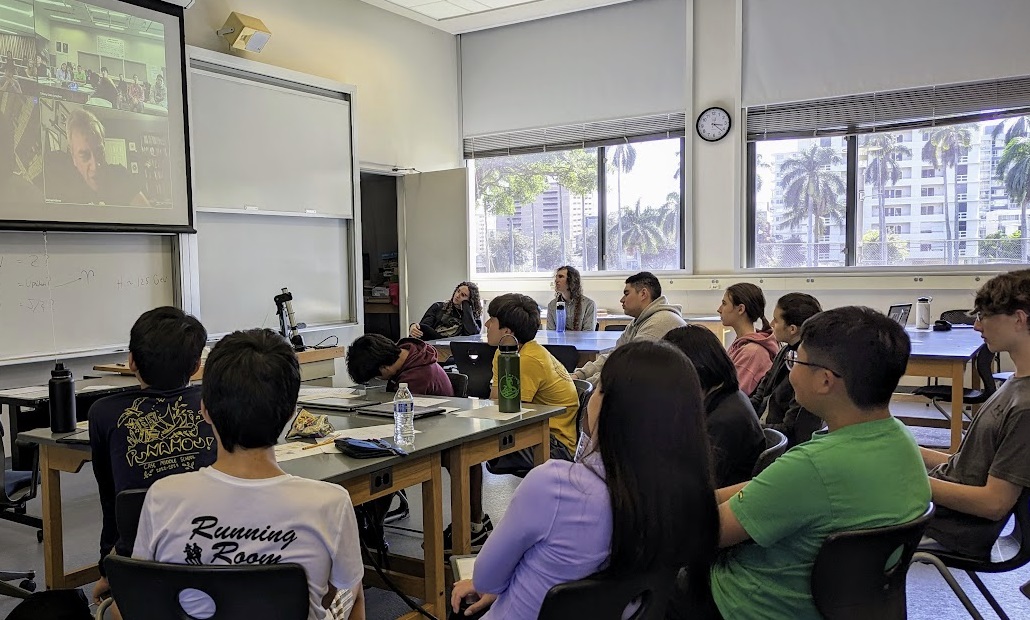Friday Flyer - November 22, 2024 - DRAFT

Spotlight on the University of Hawaii QuarkNet Center
In March 2024, Punahou School hosted a CMS masterclass, organized by lead teacher Tiffany Coke (Punahou School) and mentor Jason Kumar (University of Hawaii). Alongside the hands-on data analysis segment, students attended engaging talks by three University of Hawaii professors on topics such as dark matter, cosmology, and the Standard Model. The event also featured a panel discussion with the professors and a UH physics graduate student, culminating in a lively pizza lunch where students could ask the experts a variety of questions, ranging from physics to broader topics. The following day, Hawaii QuarkNet teachers gathered at Punahou School for a workshop focused on muons and muon detectors. During this session, teachers also exchanged ideas, shared successes and challenges, and enjoyed fresh poke while collaborating on activities. They also explored the use of the cosmic ray detector available at Punahou, enriching their understanding and classroom practices.
This center boasts a long-standing involvement in the QuarkNet cosmic ray program, with five detectors currently stationed across Oahu and Maui. One recent notable event involving these detectors took place on May 12 of this year when the BYU-Hawaii and Punahou cosmic ray detectors recorded a significant flux decrease, likely caused by a solar storm. In recent months, Cosmic Ray Fellow Nate Unterman has been actively supporting teachers and students remotely via Zoom, assisting with the detector at Kamehameha School in Honolulu. During a recent vacation to Hawaii, Nate went the extra mile by visiting the school in person, providing hands-on assistance and expertise.


News from QuarkNet Central
Registration for International Masterclasses 2025 is in full swing! Fermilab-based International Masterclasses will be held from March 10 to April 11, 2025. Circular 5 came out last week with information on schedules and registration. Note that registration for Fermilab-based masterclass videoconferences will close on December 6.
Beamline for Schools (BL4S): BL4S is a global competition for high school students offering winning teams the unique opportunity to conduct their own physics experiment at a CERN beamline. Check out the BL4S website for more information.
QuarkNet Teacher in the News: New Mexico QuarkNet teacher Turtle Haste was recently featured in the news highlighting her students' involvement in the national Float Boat project, where students decorate then track little boats in order to learn more about Arctic sea ice, ocean circulation, and weather. Here's an article about last year's deployment.
Upcoming Dates:
- International Cosmic Day 2024: The 13th International Cosmic Day will take place on November 26. Click here for more information, including how to register.
- Harvard PoLS-T HS Physics Educator Coffee Hour: 2025 AP Physics Exam Revisions with the College Board will take place virtually on November 26. More information, including how to register, can be found on the flyer.
- QuarkNet Educational Discussion (QED): The next QED session will take place via Zoom on the evening of December 18. Contact Charlie Payne (paynec@ncssm.edu) if you're interested in joining!
- AAPT Winter Meeting 2025: The AAPT WM 2025 will be held January 18-21, 2025, in St. Louis, MO. Early bird registration ends on November 25.
- Kavli Institute for Theoretical Physics Teacher Conference: The 2025 KITP Teacher Conference will focus on particle physics, and will take place in Santa Barbara on February 8, 2025. For more information, including how to register, please see the conference page. As the website indicates, financial aid for travel and lodging is awarded on a rolling basis.

Physics Experiment Roundup
From CERN...Researchers at the CMS experiment have developed and deployed a new AI algorithm to detect anomalies and improve data quality. We've mentioned in recent Friday Flyers that the LHC is colliding lead ions rather than protons for much of this month during this year's heavy-ion run. An accelerator report from last week indicated that everything has been running smoothly so far. The ATLAS collaboration recently reported observing top quarks in collisions between lead ions in earlier heavy-ion runs, opening a new window into the study of the quark-gluon plasma. From CERN's education and outreach center (Science Gateway): A mini accelerator known as ELISA (Experimental Linac for Surface Analysis) is now being used for archaeological research, marking the first time an accelerator of this type has been used for research as part of a museum exhibition.
Researchers use the Dark Energy Spectroscopic Instrument (DESI) to "weigh in" on gravity. A remarkable image captured by the Subaru Telescope shows an extremly rare triple-ring galaxy located about 800 million LY from Earth. Also from Live Science: A possible explanation for the existence of "impossible" black holes discovered by the James Webb telescope.

Resources
Don Lincoln has a new video on why Fermilab needs accelerators. Minute Physics brings us The Moon's Orbit is WEIRD, and The Periodic Table in a 2D World.
Physics Today brings us Recollection of the November Revolution and articles featuring the work behind the 2024 Nobel Prizes in Physics and Chemistry.
From the November issue of The Physics Teacher: Physics teacher apparatuses named after our academic ancestors, a quick demo of (magnetic) resonance, and Buzz Lightyear in the physics classroom.
With December quickly approaching, check out Physics in Advent, a festive and educational initiative that will feature 24 small, simple experiments each day from December 1-24.

Just for Fun
The Physics of the Macy's Thanksgiving Day Parade Balloons from Wired, Thanksgiving Chemistry from Bytesize Science, 10 Thanksgiving Experiments from Raising da Vinci, and Turkey Races from STEAM Powered Family. Notice a theme? :-)
From Nevada STEM Hub: Science Lesson from Thanksgiving Traditions, and from Science, How to Science Up Your Thanksgiving Dinner.
As we reflect on things we are grateful for, let's not forget about heat transfer and these three quantum phenomena!
From all of us at QuarkNet, have a happy and safe Thanksgiving!
QuarkNet Staff
Mark Adams: adams@fnal.gov
Ken Cecire: kcecire@nd.edu
Spencer Pasero: spasero@fnal.gov
Shane Wood: swood5@nd.edu
